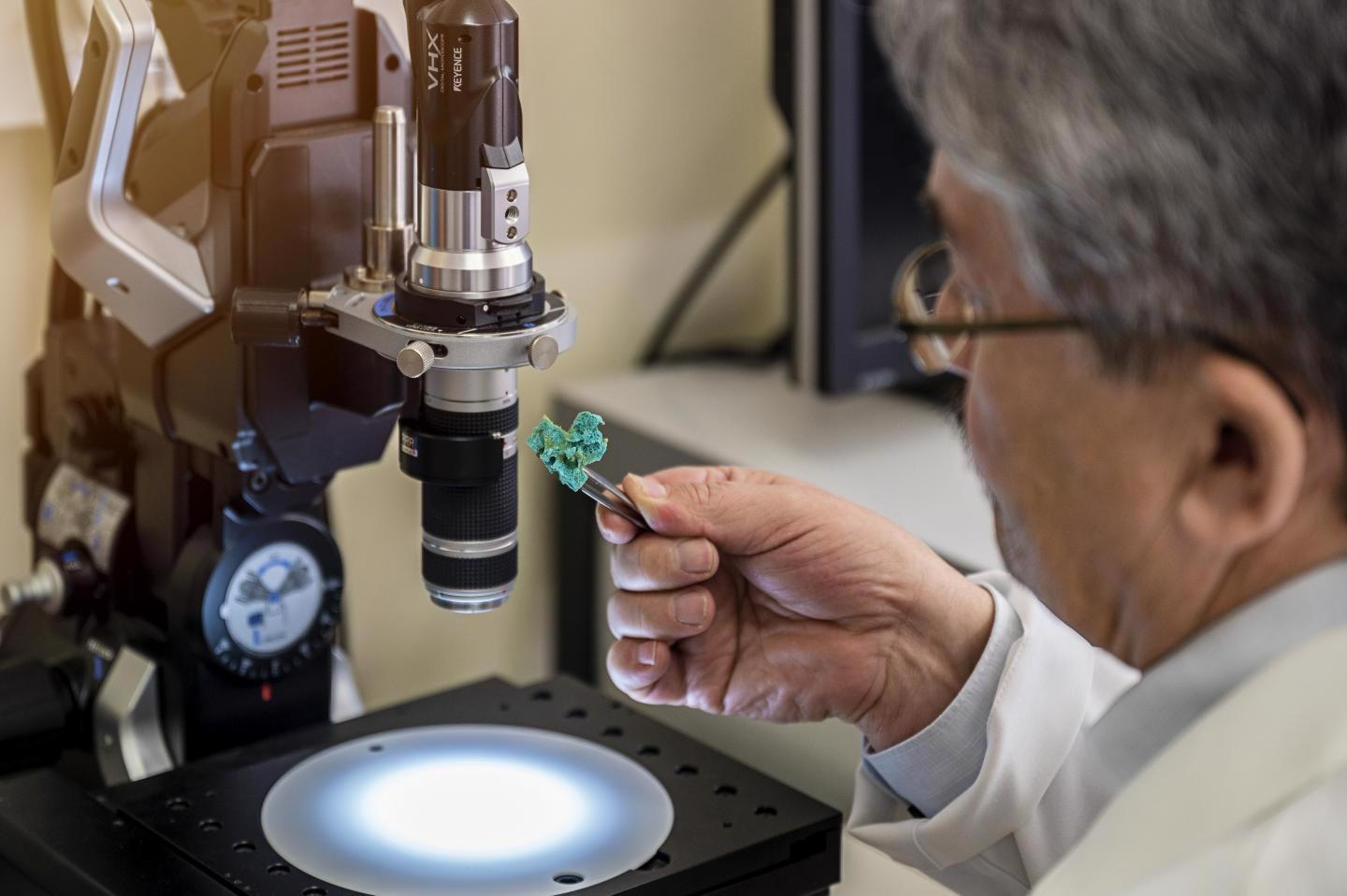Jun 17 2021
Researchers have developed an alternative to synthetic filters using marine bath sponges.
 Prof. Hermann Ehrlich looks at a piece of the new material. Image Credit: TU Bergakademie Freiberg/C. Mokry.
Prof. Hermann Ehrlich looks at a piece of the new material. Image Credit: TU Bergakademie Freiberg/C. Mokry.
During an experiment, Hermann Ehrlich, a Professor from TU Bergakademie Freiberg (University of Freiberg), added a piece of sponge to an alkaline copper-containing ammonia solution that replicated a copper bath from the manufacture of circuit boards for electronic components. After 12 hours, the sponge turned blue and when it was dried, it became stronger than before but still extremely light.
At a pH value of 9 the fibers of the spongin open and the organic compounds of the protein change.
Hermann Ehrlich, Professor, University of Freiberg
The copper present in the ammonia solution reacted immediately with the organic components of the spongin, particularly with the residue of amino acid, and formed the mineral atacamite. “Like a string, nanometer-sized crystals grow along with the spongin fiber,” explained the scientist.
The crystals stabilize the framework and ensure that the sponge is retained in its special micro-architecture. The researchers, headed by Professor Ehrlich, have reported the study results in a current publication in the Advanced Materials journal.
Can be Used as a Bio-Based Filter for Wastewater Treatment or Pollutant Removal
The newly developed three-dimensional porous material is essentially a filter. Combined with the properties of atacamite, the material has immense potential for use as an alternative to synthetic fibers.
Our team was able to demonstrate experimentally for the first time that the composite material made from marine bath sponges can in principle be used in the development of sensors, catalysts, and antibacterial filter systems.
Martin Bertau, Co-author, Professor, Institute of Chemical Technology, University of Freiberg
New Material can be Reused Many Times Over
If Professor Ehrlich had placed the blue sponge with the crystals in an acidic solution, the reaction would have been reversed, that is, the sponge would have reverted to its original state and could be processed again for more applications. “The newly developed material can therefore be recycled again and again,” added the Freiberg biomineralogist enthusiastically.
Even after up to 100 application cycles, the responsiveness of the spongin-atacamite composite is still given. If the material is ultimately no longer usable, the sponge is biodegradable and the copper is recovered from the solution–ideally, electrochemically with renewable energies. We have already shown that this is possible.
Martin Bertau, Professor and Chemist, University of Freiberg
Background: Biomineralogy and Extreme Biomimetics at TU Bergakademie Freiberg
For the past two years, scientists from Poland, Germany, Australia, Ukraine and Spain have been designing novel biomimetic models and alternatives to plastic scaffolding for contemporary materials science.
The team is supported by the German Research Foundation, the Saxon State Ministry for Science, Culture and Tourism, and the Alexander von Humboldt Foundation supported the research.
Established at TU Bergakademie Freiberg in 2013, Extreme Biomimetics is a new scientific field that deals with the investigation of artificial and natural phenomena for the development of innovative bio-inspired 3D composite materials on a centimeter-to-meter scale.
Journal Reference:
Tsurkan, D., et al. (2021) Extreme Biomimetics: Designing of the first nanostructured 3D spongin-atacamite composite and its application. Advanced Materials. doi.org/10.1002/adma.202101682.